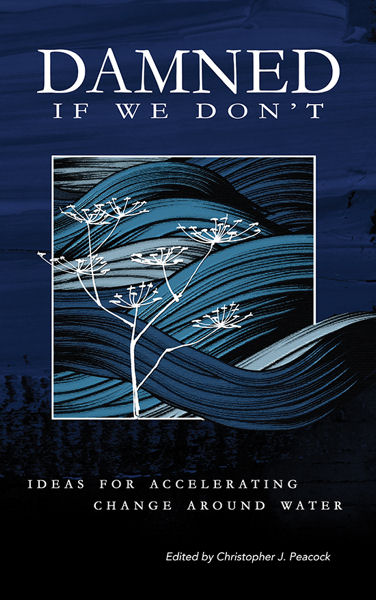
Damned If We Don’t: Ideas for accelerating change around water provides ideas for managing water. Photo courtesy of ©The Water Innovation Project LLC (Granite Bay, Calif.).
The book, Damned If We Don’t: Ideas for accelerating change around water, offers insight into water sector issues and personal stories from many different authors that include Water Environment Federation (WEF; Alexandria, Va.) members and staff. The water anthology provides ideas to better manage water with topics ranging from conservation, to innovation, to leadership.
“This book can help us learn to accelerate change in our behaviors around the management of and relationship to water,” said Christopher Peacock, editor of the book and creator of The Water Innovation Project (Granite Bay, Calif.). Water experts including utility managers, entrepreneurs, policymakers, and professors share their insight and efforts in the areas of water use, leadership, or research, he said.
In the chapter “Developing Leadership in the Water Sector,” Renee Kayal, director of Education and Training for WEF, described leadership skills that will help the water sector improve. As manager of WEF’s Water Leadership Institute program, Kayal has discovered that collaboration, flexibility, communication, determination, passion, networking, and creativity are important leadership skills, she said.
“If people took small steps, together we can really do more as an industry. The water sector is essential to everyone and by stepping back a bit from our everyday duties we can learn to be reinvigorated and improve/change our sector,” Kayal said. The book provides inspiration for pushing the water sector to a better place and accelerating change, she added.
WEF member Donna Vincent Roa, wrote the chapter, “Advancing One Water Management with One Water Communication,” to highlight the importance of language, sector-specific icons, and visually accurate concepts portraying the world of water.
“We need innovative approaches to water management, and these approaches must incorporate strategic communication and enhanced visual communication to create a more water-aware public,” said Vincent Roa, managing partner and chief executive officer for Vincent Roa Group LLC (Rockville, Md.). Increased awareness of water and water utilities benefits everyone in the water sector. “Communication helps to accelerate positive change and push the boundaries of change,” Vincent Roa added.
Todd Danielson, WEF member and participant in WEF’s Government Affairs committee, discussed the importance of utilities expanding their communication toolbox by embracing social media in the chapter “Social Media. For best results, don’t block it at your utility.”
“A well-developed social media network can serve as effective information sharing platforms and can help get emergency information in the hands of its customers in minutes,” said Danielson, chief utilities executive for Avon Lake (Ohio) Municipal Utilities. “The strategic and interactive use of social media allows the utility to help create and/or steer discussions, rather than just dealing with firestorms resulting from bad press.” He calls the book “empowering” and “an interesting and easy read.”
Another WEF member, Jim Ginley, discusses the changing and evolving role of utilities in finding and implementing innovative technologies in the chapter, “Technology, Utilities and Innovation – from ‘What if?’ to ‘Here’s how.’” Utilities play a role in getting new technology to the market by any combination of their own efforts or collaboration with other utilities, technology companies, investors, and research organizations, he said.
“Overall, the book, or anthology, is a great collection of diverse topics, from climate change impacts on water to professional development; from technology clusters/centers to software solutions,” Ginley said. It offers real and practical examples of what those in the water sector are doing to make a difference, he added.
The book, published by Water Anthology Press, is available in the WEF Bookstore or as a Kindle edition online.
— Jennifer Fulcher, WEF Highlights








January 15, 2015
Featured, Learning Opps